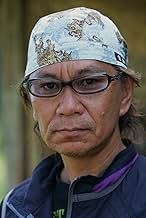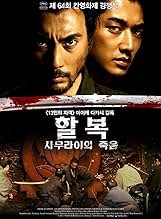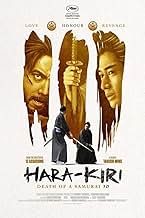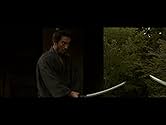IMDb रेटिंग
7.3/10
9.5 हज़ार
आपकी रेटिंग
अपनी भाषा में प्लॉट जोड़ेंA tale of revenge, honor and disgrace, centering on a poverty-stricken samurai who discovers the fate of his ronin son-in-law, setting in motion a tense showdown of vengeance against the hou... सभी पढ़ेंA tale of revenge, honor and disgrace, centering on a poverty-stricken samurai who discovers the fate of his ronin son-in-law, setting in motion a tense showdown of vengeance against the house of a feudal lord.A tale of revenge, honor and disgrace, centering on a poverty-stricken samurai who discovers the fate of his ronin son-in-law, setting in motion a tense showdown of vengeance against the house of a feudal lord.
- पुरस्कार
- 6 कुल नामांकन
Eita Nagayama
- Motome Chijiiwa
- (as Eita)
Gorô Daimon
- Priest
- (as Goro Daimon)
कहानी
क्या आपको पता है
- ट्रिवियाThe first 3D title ever to be shown in official selection at the Cannes Film Festival.
- गूफ़As the wooden wakizashi is pushed into the stomach (after the tip snapped off), you can see that the blade is sliding into the handle.
- भाव
Hanshirô Tsugumo: A warrior's honor is not something simply worn for show!
- कनेक्शनFeatured in At the Movies: Cannes Film Festival 2011 (2011)
फीचर्ड रिव्यू
Anyone with a more than passing interest in Japanese movies ought to watch Kobayashi's 1962 version of Takaiguchi's novel that this also is based on, and watch the intro by the Japanese film authority Donald Ritchie on the Criterion edition. Ritchie makes fully clear how Kobayashi here, as in other films, is talking through the historical tale about current issues he was passionate about, in this case lingering post-WWII authoritarianism in Japan and hollow bureaucracies, in his day as in the time of the early Tokugawa government; Miike doesn't seem to have anything particularly urgent to say. Look at what Ritchie points out that Kobayashi's version offers: the script by ace screenwriter Shinobu Hashimoto who wrote Akira Kurosawa's Seven Samurai; the score by bold, influential experimentalist Toru Takemitsu; the strong and unifying symbolic use of empty samurai armor throughout; the career-defining lead performance by Tatsuya Nakadai; and the elegantly austere use of black and white cinematography.
Ironically Miike's film also carries over Kobayashi's one serious flaw - - an overindulgence in sentimentality and pathos in the flashback love story.
Miike, apparently seeking 'respectability' after all his entertaining ultra-violence with this staid remake/adaptation, also overdoes everything. He makes every scene too drawn-out and talky. He further overdoes the sentimentality, to the point that in his version becomes unbearably cloying, virtually unwatchable. Once again, 3D adds nothing; black and white was just what was needed. Less was and is more.
Whenever a filmmaker goes over familiar ground, adapting a book that has been adapted (and very well) before, he exposes himself to comparisons to the book and to the previous adaptation. Don't get me wrong. Miike has plenty of skill. It is not that his 'Hara- Kiri' is a washout. It's just that Kobayashi's version is a true work of art, a film classic, in fact; and in comparison Miike's is merely a competent effort and a pointless bid for respectability that was not needed. He is a master in his own realm. Surprisingly his last film before this, the juicy, action-historical blockbuster 13 Assassins, which I thoroughly enjoyed, also was an adaptation -- of Eiichi Kudo's little known samurai film of the same name. Thanks to 'Wildgrounds' (who compare the two Hara- Kiri films) for this info. Thanks also to Ben Parker on 'CapitalNewYork' for his detailed comparison of the two films; and to the Criterion Collection, for its print of Kobayashi's 'Hara-Kiri' and Donald Ritchie's informed introduction to it.
Ironically Miike's film also carries over Kobayashi's one serious flaw - - an overindulgence in sentimentality and pathos in the flashback love story.
Miike, apparently seeking 'respectability' after all his entertaining ultra-violence with this staid remake/adaptation, also overdoes everything. He makes every scene too drawn-out and talky. He further overdoes the sentimentality, to the point that in his version becomes unbearably cloying, virtually unwatchable. Once again, 3D adds nothing; black and white was just what was needed. Less was and is more.
Whenever a filmmaker goes over familiar ground, adapting a book that has been adapted (and very well) before, he exposes himself to comparisons to the book and to the previous adaptation. Don't get me wrong. Miike has plenty of skill. It is not that his 'Hara- Kiri' is a washout. It's just that Kobayashi's version is a true work of art, a film classic, in fact; and in comparison Miike's is merely a competent effort and a pointless bid for respectability that was not needed. He is a master in his own realm. Surprisingly his last film before this, the juicy, action-historical blockbuster 13 Assassins, which I thoroughly enjoyed, also was an adaptation -- of Eiichi Kudo's little known samurai film of the same name. Thanks to 'Wildgrounds' (who compare the two Hara- Kiri films) for this info. Thanks also to Ben Parker on 'CapitalNewYork' for his detailed comparison of the two films; and to the Criterion Collection, for its print of Kobayashi's 'Hara-Kiri' and Donald Ritchie's informed introduction to it.
- Chris Knipp
- 24 जून 2015
- परमालिंक
टॉप पसंद
रेटिंग देने के लिए साइन-इन करें और वैयक्तिकृत सुझावों के लिए वॉचलिस्ट करें
- How long is Hara-Kiri: Death of a Samurai?Alexa द्वारा संचालित
विवरण
- रिलीज़ की तारीख़
- कंट्री ऑफ़ ओरिजिन
- आधिकारिक साइटें
- भाषा
- इस रूप में भी जाना जाता है
- Hara-Kiri: Death of a Samurai
- उत्पादन कंपनियां
- IMDbPro पर और कंपनी क्रेडिट देखें
बॉक्स ऑफ़िस
- US और कनाडा में सकल
- $75,688
- US और कनाडा में पहले सप्ताह में कुल कमाई
- $10,920
- 22 जुल॰ 2012
- दुनिया भर में सकल
- $54,35,358
- चलने की अवधि2 घंटे 8 मिनट
- रंग
- ध्वनि मिश्रण
- पक्ष अनुपात
- 2.35 : 1
इस पेज में योगदान दें
किसी बदलाव का सुझाव दें या अनुपलब्ध कॉन्टेंट जोड़ें
































